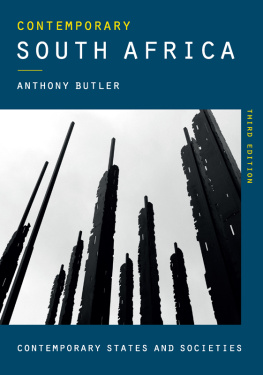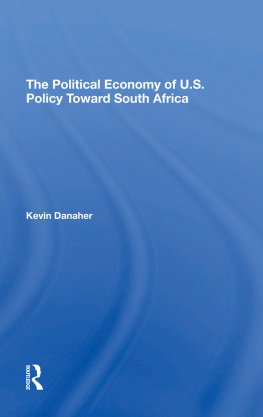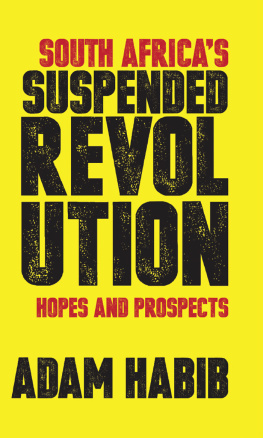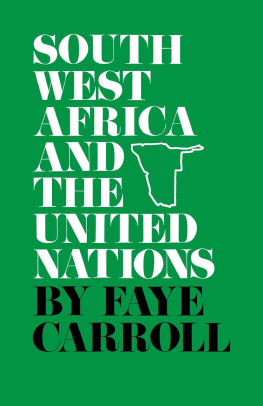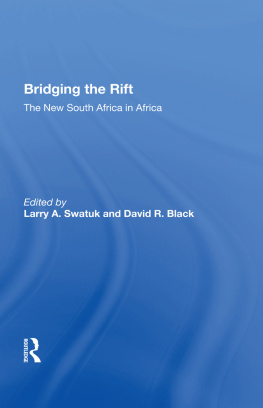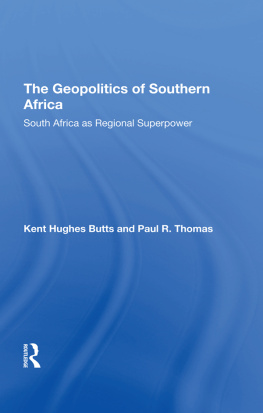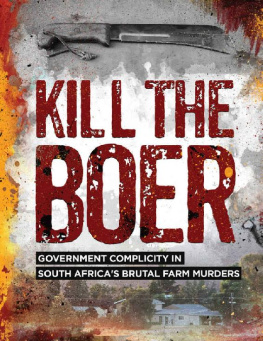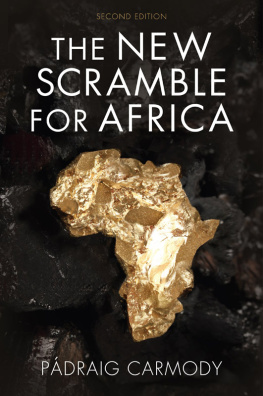Contemporary South AfricaContemporary States and Societies
This series provides lively and accessible introductions to key countries and regions of the world, conceived and designed to meet the needs of todays students. The authors are all experts with specialist knowledge of the country or region concerned and have been chosen also for their ability to communicate clearly to a non-specialist readership. Each text has been specially commissioned for the series and is structured according to a common format.
Published
Contemporary Russia (3ed)
Edwin Bacon
Contemporary South Africa (3ed)
Anthony Butler
Contemporary America (4ed)
Russell Duncan
and Joseph Goddard
Contemporary China
Alan Hunter
and John Sexton
Contemporary Japan (3ed)
Duncan McCargo
Contemporary Britain (3ed)
John McCormick
Contemporary Latin America (3ed)
Ronaldo Munck
Contemporary India
Katharine Adeney
and Andrew Wyatt
Contemporary France
Helen Drake
Contemporary Ireland
Eoin OMalley
Forthcoming
Contemporary Spain
Paul Kennedy
Contemporary Asia
John MKay
Also planned
Contemporary Germany
Contemporary Italy
Contemporary South Africa
Third edition
Anthony Butler
Anthony Michael Butler 2004, 2009, 2017
All rights reserved. No reproduction, copy or transmission of this publication may be made without written permission.
No portion of this publication may be reproduced, copied or transmitted save with written permission or in accordance with the provisions of the Copyright, Designs and Patents Act 1988, or under the terms of any licence permitting limited copying issued by the Copyright Licensing Agency, Saffron House, 610 Kirby Street, London EC1N 8TS.
Any person who does any unauthorized act in relation to this publication may be liable to criminal prosecution and civil claims for damages.
The author has asserted his right to be identified as the author of this work in accordance with the Copyright, Designs and Patents Act 1988.
First edition 2004
Second edition 2009
Third edition published 2017 by
Palgrave
Palgrave in the UK is an imprint of Macmillan Publishers Limited, registered in England, company number 785998, of 4 Crinan Street, London N1 9XW.
Palgrave and Macmillan are registered trademarks in the United States, the United Kingdom, Europe and other countries.
ISBN 9781137373373 hardback
ISBN 9781137373366 paperback
This book is printed on paper suitable for recycling and made from fully managed and sustained forest sources. Logging, pulping and manufacturing processes are expected to conform to the environmental regulations of the country of origin.
A catalogue record for this book is available from the British Library.
A catalog record for this book is available from the Library of Congress.
List of Tables, Maps, and Boxes
Tables
Maps
Boxes
Preface to the Third Edition
Twentieth-century South Africa was notorious for apartheid, a system of institutionalised racial and ethnic segregation. Apartheid involved the racial classification of a historically complex and diverse South African population as White, Native (later Bantu and then Black), Indian, and Coloured. These terms have been contested politically by many of those to whom they have been applied. Their use entrenches assumptions about racial difference that have no scientific validity. In this book, where racial terminology is used, the term African refers to those officially classified as Native or Black under apartheid. Black refers more widely to all those categorised as Black, Indian, and Coloured. I capitalise such terms throughout in order to emphasise their problematic nature.
This book compresses the complex and fast-changing reality of contemporary South Africa. I hope readers will forgive inevitable omissions and over-simplifications. In line with the series style, references have been kept to a minimum: student readers should note that this approach to identifying sources is not suitable for academic essays. Guides at the end of the book direct interested readers towards published and Internet sources of information and analysis on South Africa.
Colin Bundy, Anne Jellema, Samson Muradzikwa, Howard Walker, and various anonymous readers have offered generous advice about this and previous editions of the book. Cliff Butlers help was invaluable in the preparation of the final manuscript. I am grateful once again to my colleagues at the University of Cape Town for making the Department of Political Studies such a stimulating environment in which to study and teach South African politics and public policy.
Parts of first appeared in a different form in volume 38 of Government and Opposition. Many of the themes developed in various chapters were first elaborated on the pages of Business Day.
Anthony Butler
Cape Town
September 2016
Introduction
Map 1.1 South Africa today
South Africa has been notorious for the racial segregation and apartheid (or apartness) that dominated her twentieth-century history. The country was so much a special focus of international opprobrium that it is sometimes hard to recall how commonplace racial oppression has been in other societies. It has also proved very difficult for even the wealthiest societies to dismantle the mechanisms that perpetuate institutionalised racism.
Other colonial settler societies were characterised by racial segregation. South Africa was merely one of many examples of violent European conquest in Africa. Doctrines that embodied assumptions of White supremacy, and mechanisms of residential and workplace segregation, were the norm in the era of imperial consolidation in Africa. The exclusion of Africans from commercial farming, controls on African land ownership outside native reserves, and the ruthless protection of White interests were also scarcely abnormal.
South Africa nevertheless exhibited certain unusual features. The country went through massive social upheavals after the discovery of diamonds and gold towards the end of the nineteenth century, and it underwent urbanisation and economic development unprecedented on the continent. Rapid development intensified the system of cyclical African migrant labour that provided cheap workers for the mines, factories, and commercial farms. The conflict between settlers of Dutch descent and the British Empire, culminating in the Boer War or South African War at the end of the nineteenth century, pitted two organised settler communities against one another. But the exclusion of almost all Blacks from the formal political institutions of the Union of South Africa created in 1910 reflected wider assumptions about racial hierarchy that were prevalent across the major European Empires.
A second industrial revolution, before and during the Second World War, threw Black and White together in burgeoning cities and skill-starved work-places, especially in the mining and industrial economy of Johannesburg and the Witwatersrand. After a Whites-only national election in 1948, racial segregation was reasserted under the slogan apartheid, partly in an attempt to reverse the class and racial mixing that rapid urbanisation had brought. Pernicious new restrictions were placed on interactions between races, and on the residual rights and freedoms of Black people.

